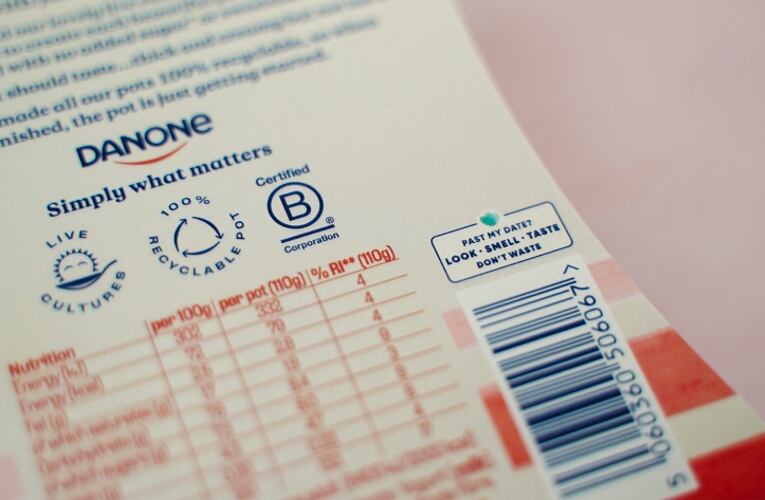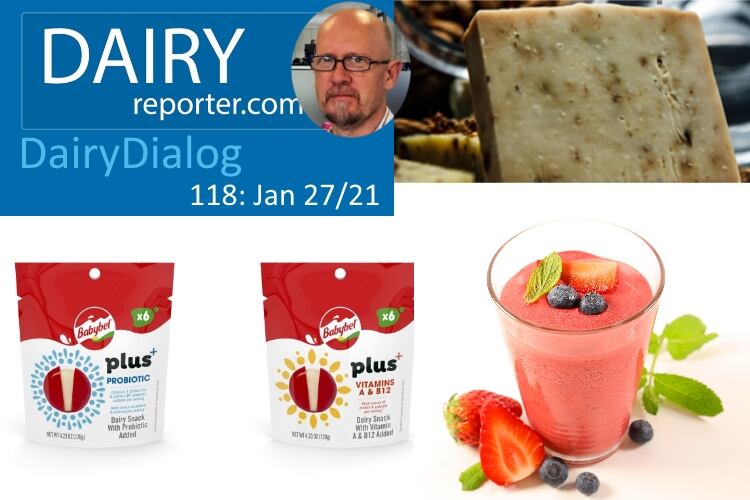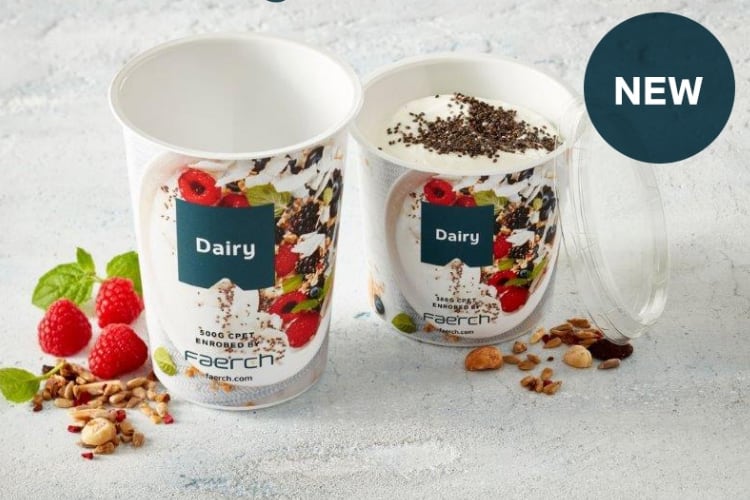We also have our weekly look at the global dairy markets with Liam Fenton, at StoneX.
Danone on probiotics and covid-19
In an article last month in mBio, the journal of the American Society for Microbiology, Heenam Stanley Kim, PhD, from Korea University’s Laboratory for Human-Microbial Interactions in Seoul, said as both elderliness and chronic conditions are often associated with an altered gut microbiota, resulting in disrupted gut barrier integrity, and gut symptoms have consistently been associated with more severe illness in COVID-19 patients, it is possible dysfunction of the gut as a whole influences COVID-19 severity.
Kim said evidence supports the hypothesis that an altered gut microbiota and an associated leaky gut may contribute to the onset of coronavirus disease 2019 (Covid-19)-related gastrointestinal symptoms, such as diarrhea and, in severe cases, multiorgan complications.
Testing for a leaky gut and fecal and plasma viral loads may be useful for diagnosing the seriously ill or for preventing transmission by fecal shedding of the virus.
The study also said while developing treatments and vaccines for COVID-19 is crucial, exploiting the gut microbiota to improve disease prevention and management may also be important. The first treatment to be considered for the seriously ill may be fecal microbiota transplantation (FMT).
Kim also said the development of next-generation probiotics focusing on butyrate-producing gut microbes can also be pursued, as well as simply increasing the daily intake of dietary fiber, which may markedly help improve gut health.
A study is also currently being undertaken at Rutgers University in the US, which explores the potential connection between the microbiome and COVID-19. This Danone-funded pioneering study predicts that the health of the gut microbiome pre-infection is a predictor of the severity of Covid-19.
Consumers are now even more interested in health and immunity. Immunity is the top priority motivating the use of supplements (68%) and functional foods (67%), with probiotics among the most sought-after ingredients consumers looking to increase (Hartman Group’s Functional Foods, Beverages and Supplements).
DairyReporter spoke with Miguel Freitas, PhD, nutrition scientist at Danone, about the recent studies, about probiotics and their role in preventative health, and what the global company is currently doing in probiotics and health.
Faerch launches new recycled mono-PET Eco HotPro product range for dairy market that can withstand high-temperature sterilization
Danish sustainable food packaging solutions company Faerch is introducing its new Eco HotPro product family, a new circular mono-PET pot range for hot fill food applications, developed to allow high-temperature sterilization (HTS).
High-temperature sterilization is an important feature in many dairy categories and requires packaging to withstand temperatures of up to 120 degrees Celsius. The new Eco HotPro Pot range is based upon Faerch’s CPET technology, meeting these requirements whilst still being fully circular.
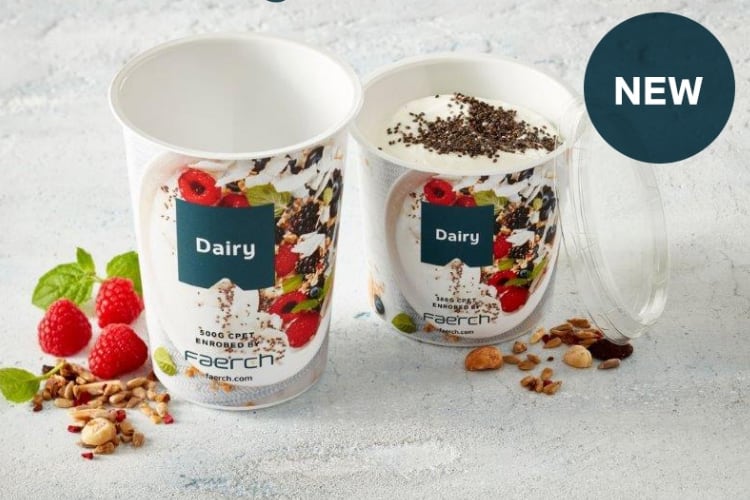
Eco HotPro Pots are made from up to 75% of recycled post-consumer content, which the company said does not compromise on food safety or any other functional property. After use, they can be recycled to new food grade products of the same quality in an endless number of life cycles.
Legacy material PP, which has so far been widely used for high-temperature sterilization in dairy applications, is by no means circular. Like PS, for food safety reasons, PP products need to be made from 100% virgin material. They can only be downcycled to non-food applications, contradicting the basic principles of a circular economy.
PP and PS are increasingly affected by implemented legislation across Europe to support the transition towards circularity. Like in other countries, PP will be impacted by the plastic packaging tax taking effect by April 2022 in the UK, as it cannot meet the threshold of a minimum of 30% recycled content in direct food contact applications.
With the new Eco HotPro Pot product family, customers can choose from a wide range of shapes, cut sizes and colors including white. Eco HotPro can also be combined with the Evolve by Faerch concept, where no extra colors are added to the recycled content the pots are made from. This creates varying material colors, reflecting the specific blend of recycled content a pot is made from and allowing consumers to recognize the circular nature of the packaging.
“We are seeing the key players in the dairy market across Europe taking their responsibility very seriously to move towards more sustainable packaging solutions. With the large volumes they place into the market and their demanding functional requirements, like high-temperature sterilization, the transition towards circularity is not an easy task for dairies,” said Spencer Johnston, CEO of Faerch UK.
“We are proud that we can contribute by introducing our Eco HotPro Pot range allowing dairies to switch to truly circular packaging solutions. Circularity in food packaging is not a distance vision for us, it is reality already today: We manufacture food containers from recycled post-consumer content and recycle them back into food grade material. We do this every day at industrial scale.”
The launch of the Eco HotPro product range is part of a wider product development program to drive the transition of food packaging towards circularity. Faerch has launched product ranges made from up to 100% post-consumer content, and the company said its portfolio will be extended in 2021 to additional applications.
Faerch said it is increasingly substituting rPET generated from bottles by post-consumer content recycled from food trays to make this resource pool accessible. The tray volumes Faerch have recycled in its integrated recycling facility in the Netherlands correspond to 25m rPET trays per month, and the numbers are increasing further.
UK food waste company partners with dairy giants on education campaign
Too Good To Go, a UK anti-food waste company, has partnered with a range of food companies – including those in dairy – to tackle date label confusion and help eliminate food waste.
The ‘Look, Smell, Taste, Don’t Waste’ campaign, which launches this week, already has 25 brands signed up, and Too Good To Go is calling on others to follow.
The campaign will see brands switching products from “Use By” to “Best Before” labels where appropriate, as well as giving on pack reminders to consumers to use their senses to decide whether to eat food past its Best Before.
The Best Before date is an indicator of quality rather than safety. Food can be safe to eat after the date shown, but it’s flavor and texture may not be as good quality. On the other hand, Use By dates are safety measures stating that food should not be eaten after the date shown, regardless of whether it looks and smells fine.
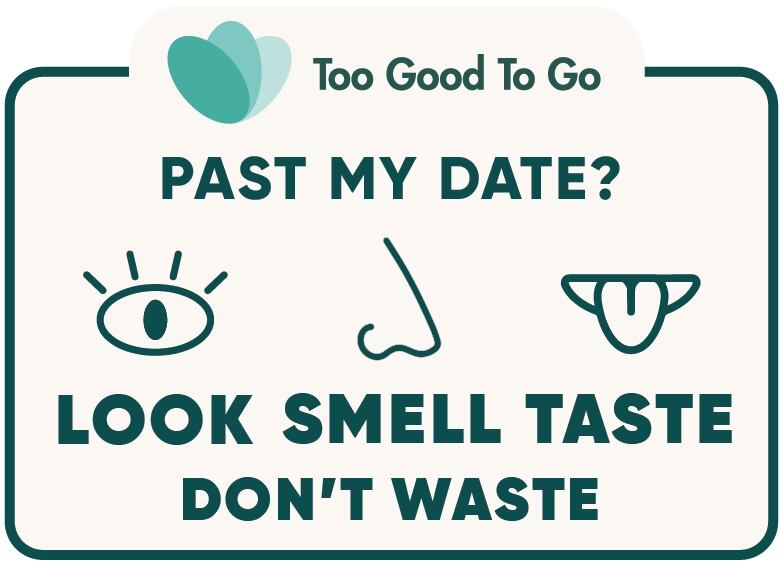
New research conducted by Too Good To Go suggests in the UK 45% of adults are confused about the true meaning of “Best Before” labels on food. When it comes to checking whether food is good to eat or not, 39% of Brits do not use their senses to make a decision about food that is past its “Best Before” date. This is leading to food being thrown away unnecessarily.
Among the 25 companies taking part and signing up to the ‘Look, Smell, Taste, Don’t Waste’ campaign are dairy-related companies Arla, Bel Group, Danone, Emmi UK, Nestlé and Savencia.
Some Best Before product lines from the companies’ brands will include a new pictogram, created by Too Good To Go, to remind consumers to trust their senses instead of just relying on “Best Before” date labels.
Other companies involved are The Bay Tree, Loving Foods, Alternative Foods (OGGS), Greens for Good, The Cornish Cheese Co, Dunsters Farm, Sea Chips, SpareSnacks, Nibs Etc., Glorious Game, Eat Love Raw, Punchy Drinks, Dash Water, and Fruity Packs.
Jamie Crummie, co-founder of Too Good To Go, said, “Date labeling has long caused confusion and unnecessary food waste in the UK. If we are to make significant strides to reducing food waste, we need to take action now. This is why we’re launching our national, industry-wide ‘Look, Smell, Taste, Don’t Waste’ campaign.
“I’m delighted that we’re launching this campaign alongside 25 household brands. To have Arla, Bel Group, Danone, Emmi UK, and Nestle already committing to educate their consumers, is a huge testament to the power that collective action can have. I’m calling on other brands who haven’t yet taken the steps to join the campaign to get in touch - we’d love to have you join our food waste movement.”
Harriet O’Regan, director for milk, Arla, said, “Having previously been the first in the milk category to make the switch from Use By to Best Before, helping consumers reduce food waste is something that Arla and our farmer owners are extremely passionate about. Milk is one of the most wasted foods in the home, so to extend our previous work in tackling label confusion and support the ‘Look, Smell, Taste, Don’t Waste’ campaign is another way we can play a part in reducing the amount of valuable milk that ends up being poured away.
“As part of our commitment, we will be rolling out the campaign messaging on Arla Cravendale milk to help consumers use their senses instead of relying on date labeling.”
Elodie Parre, CSR director at Bel Group, said, “For over 150 years, the portion format has been the signature of the Bel Group. It represents a major asset in the fight against food waste, allowing optimal preservation of products and the right portion of nutrition. As an actor committed to healthier and more responsible food for all, Bel fights against food waste at each stage of the production of our cheeses, from farm to plate and has the power to engage consumers, and new generations. Alongside Too Good To Go and the other members of the campaign we want to raise awareness and engage our consumers in the movement.”
Adam Grant, regional VP Danone Essential Dairy and Plant Based, UK & Ireland, said, “It’s shocking to think that more than 6 million tonnes of food is wasted in UK households each year. In line with our ‘One Planet. One Health’ vision and our B Corp commitment, I’m proud that Danone Essential Dairy & Plant-based brands are some of the first brands joining Too Good To Go’s 'Look, Smell, Taste, Don't Waste' campaign and moving from ‘Use By’ to ‘Best Before’ date labelling. We'll also be adding campaign messaging to our packs to encourage our consumers to use their senses to avoid needless waste.
“With some of the nation’s favorite yogurt brands making this move, we will play a role in preventing unnecessary household food waste while supporting consumers to understand when food is still safe to eat.”
Alice Carey, sustainability manager at Emmi UK said, “Emmi UK is delighted to be one of the inaugural brands joining the UK launch of the Too Good To Go campaign addressing date label confusion in the bid to reduce food waste. As the UK's No. 1 Flavoured Big Pot Yogurt Brand and having used ‘Best Before’ labeling for many years now, from January 2021, the Emmi owned Onken brand will also highlight the "Look, Smell, Taste, Don’t Waste" messaging on its packaging.”
Stefano Agostini, CEO, Nestlé UK&I said, “Building on our work in reducing food waste across our operations, we’re delighted to support Too Good To Go’s 'Look, Smell, Taste, Don't Waste' campaign. With an estimated 180,000 tonnes of food wasted every year across the UK due to confusion over date labeling, it is crucial that food manufacturers and retailers take collaborative action and a consistent approach to helping consumers reduce food waste.
“Nestlé will be rolling out the new labeling on a progressive basis, across key products produced in the UK and Ireland, to support consumers in the war on waste.”
Christophe Sire, general manager, Savencia UK&I, said, “We are delighted to be part of the Too Good to Go’s ‘Look, Smell, Taste, Don’t Waste’ campaign as it reaffirms Savencia’s commitment in fighting food waste in the UK. The objective of this campaign is to reduce confusion over date labeling in order to reduce food waste. We will be supporting Too Good To Go through the progressive introduction of new labeling on some of our cheeses.”
Ben Elliot, the Food Surplus and Waste Champion for Defra said, “Every year, significant amounts of food are unnecessarily wasted across the country.
“Often food that has passed its ‘Best Before’ date is perfectly safe to eat for weeks, or even months after. It is important that we help people better understand whether produce is safe to eat, and that information on food is clear, helping people make these decisions.
“I strongly support the Too Good To Go campaign and its goal to tackle food waste – and by partnering with a great variety of brands and retailers, I hope that we see a real difference soon.”


